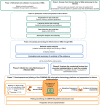Comparing the effectiveness and cost-effectiveness of self-management interventions in four high-priority chronic conditions in Europe (COMPAR-EU): a research protocol
- PMID: 31959612
- PMCID: PMC7044921
- DOI: 10.1136/bmjopen-2019-034680
Comparing the effectiveness and cost-effectiveness of self-management interventions in four high-priority chronic conditions in Europe (COMPAR-EU): a research protocol
Abstract
Introduction: Population ageing and increasing chronic illness burden have sparked interest in innovative care models. While self-management interventions (SMIs) are drawing increasing attention, evidence of their efficacy is mostly based on pairwise meta-analysis, generally derived from randomised controlled trials comparing interventions versus a control or no intervention. As such, relevant efficacy data for comparisons among different SMIs that can be applied to specific chronic conditions are missing. Therefore, the relevance of the available evidence for decision-making at clinical, organisational and policy levels is limited.
Aim: To identify, compare and rank the most effective and cost-effective SMIs for adults with four high-priority chronic conditions: type 2 diabetes, obesity, chronic obstructive pulmonary disease,and heart failure.
Methods and analysis: All activities will be conducted as part of the cost-effectiveness of self-management interventions in four high-priority chronic conditions in Europe(COMPAR-EU, Comparing effectiveness of self-management interventions in 4 high priority chronic diseases inEurope) Project, an European Union (EU)-funded project designed to bridge the gap between current knowledge and practice on SMIs. In the first phase of the project, we will develop and validate a taxonomy, and a Core Outcome Set for each condition. These activities will inform a series of systematic review and network meta-analysis about the effectiveness of SMIs. We will also perform a cost-effectiveness analysis of the most effective SMIs and an evaluation of contextual factors. We will finally develop tailored decision-making tools for the different relevant stakeholders.
Ethics and dissemination: Ethical approval was obtained from the local ethics committee (University Institute for Primary Care Research - IDIAP Jordi Gol). All patients and other stakeholders will provide informed consent prior to participation. This project has been funded by the EU Horizon 2020 research and innovation programme (grant agreement no. 754936). Results will be of interest to relevant stakeholder groups (patients, professionals, managers, policymakers and industry), and will be disseminated in a tailored multi-pronged approach that will include deployment of an interactive platform.
Keywords: health economics; protocols & guidelines; public health; qualitative research; statistics & research methods.
© Author(s) (or their employer(s)) 2020. Re-use permitted under CC BY. Published by BMJ.
Conflict of interest statement
Competing interests: None declared.
Figures


References
-
- Patient empowerment-who empowers whom? Lancet (London, England) [Internet]., 2012. Available: http://www.ncbi.nlm.nih.gov/pubmed/22559881 [Accessed 4 Oct 2016]. - PubMed
-
- Anderson G, Hopkins J. Responding to the growing cost and prevalence of people with multiple chronic conditions, 2007.
-
- Bycroft JJ, Tracey J. Self-Management support: Awin-win solution for the 21st century. N Z Fam Physician 2017;33:243–8.
Publication types
MeSH terms
LinkOut - more resources
Full Text Sources
Medical
Research Materials
Miscellaneous
